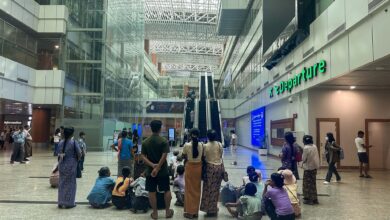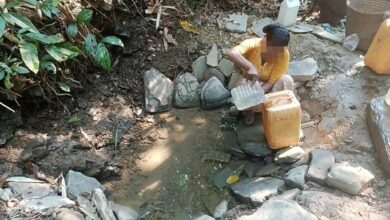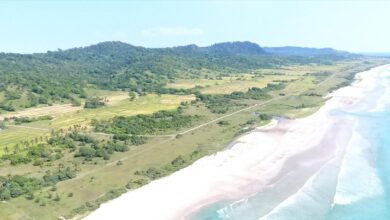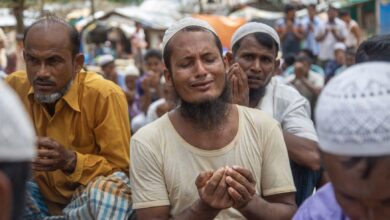
We were gathering in downtown Yangon to protest the coup in March 2021, and I was talking to my coworkers, waiting for others to arrive—there were four or five of us. It was still early, and we were planning to march. A car stopped suddenly in front of us. It was a civilian vehicle, so we didn’t pay attention to it.
The next events happened very fast, over only a few seconds. Junta soldiers got out of the car and pointed their guns at us. They dragged one of my colleagues into their car right in front of us and drove away.
We didn’t register what was happening. I remember I was holding an umbrella, and there were small rocks on the ground around me. We ran after the car, throwing these rocks at it, but we couldn’t catch it.
Then, almost immediately, two or three military vehicles pulled in front of us. Our only thought was that we couldn’t let them capture the rest of us.
We turned to one another and said, ‘let’s change direction.’
As the vehicles turned toward us, we ran the opposite way, and found a place to hide behind a six-foot-high wall. I don’t even remember how we found that spot, or how we managed to climb over it. But we hid there for hours until late afternoon or the evening.
When I think about that incident now, I feel guilty. We couldn’t do anything when our colleague was arrested. I wonder if I was selfish to try to save myself. I feel it all over again as I tell the story now. I feel the same goosebumps when I revisit the memory.
I feel now exactly as I felt during our escape.
This is trauma, the professor explained.
“We can assume that nearly everyone in this country is suffering from [it],” she said, noting that even as a psychology lecturer and practising therapist, she was not spared the emotional scars left by Myanmar’s coup.
Speaking on the condition of anonymity from the Thai border, she told Myanmar Now that she left her university teaching post in Yangon days after the military’s attempted seizure of power on February 1, 2021. Like hundreds of thousands of others, she joined a nationwide general strike as part of the Civil Disobedience Movement (CDM) in defiance of the junta and driven by the need to live “with a clean conscience.”
“The main difference I witnessed in people before and after the coup was a feeling of being unsafe, physically and emotionally,” she said, adding that this phenomenon was preceded by decades of civil war and military subjugation which elicited similar responses. “This has happened to us many times… although we may not acknowledge it, we all carry this collective trauma, in addition to our personal traumas.”
After a long period in hiding, she crossed the border to neighbouring Thailand earlier this year, joining thousands of others fleeing arrest, torture, or death at the hands of the Myanmar regime only to face a new set of challenges in exile.
This has happened to us many times… although we may not acknowledge it, we all carry this collective trauma, in addition to our personal traumas
A therapist in exile
There, she found people living with “constant worry and anxiety” due to a lack of identity documents, insecurity around accommodation, a persisting fear of police, and the devastation of being unable to continue their education and work.
She became the leading practitioner in a community-based project started in January with the aim of providing psychological support—including trauma treatment—to affected individuals from Myanmar.

One of the program’s founders, a veteran education activist from Myanmar based in Thailand, said that the idea came to him while distributing aid to people fleeing junta attacks to the shores of the Thaungyin—or Moei—River, which separates the two countries.
“We saw that people were traumatised, hearing the shelling across the river, unable to sleep at night. It took us over a year to understand how widespread this was, and what was really needed,” he explained.
Like every source interviewed for this story, he asked that his identity be withheld for his security.
“Trauma is ingrained, even in me. This issue has been here for a long time—other organisations from the outside have come and gone, but we need to provide long-standing support.”
As with many other local initiatives serving the needs of those displaced to Thailand, the mental health project operates discreetly, without a physical office. This is largely due to a fear—not unfounded—that it could be halted by the authorities, or that undocumented individuals affiliated with or participating in the program could be targeted for deportation back to Myanmar, where they might face arrest, or worse.
The project’s main activity has been the delivery of workshops attended by members of local organisations and those in their networks. These trainings, lasting up to four days, have focused on building resilience and providing “psychological first aid,” or immediate interventions for trauma survivors.
Trauma is ingrained, even in me. This issue has been here for a long time—other organisations from the outside have come and gone, but we need to provide long-standing support
An education activist from Myanmar based in Thailand
At the time of reporting, six workshops had been held for around 100 participants.
Myanmar Now observed one such session led by the professor, attended by around 15 staff and volunteers from a border-based civil society group, among whom were both recent arrivals fleeing post-coup Myanmar and those from the long-standing diaspora.
She opened with a simple discussion allowing participants to define terms like “emotion,” “stress” and “trauma.”
When participants were asked for examples of the latter, they hesitantly cited traffic accidents, child abuse, addiction. The professor and her two co-facilitators listened, affirming the examples, before gently encouraging a shift in the discussion to the current context in Myanmar.
“Sources of trauma are also political,” the professor told the group. “Torture, arrest, and the burning of houses—these are traumas, too.”
Traumatic experiences can affect one’s ability to focus, learn, retain memories, and exhibit emotional control, she explained. For this reason, each workshop includes a participant self-assessment, revealing the individual’s existing knowledge of mental health and their coping strategies for stress.
Data revealed that participants’ reasons for seeking help ranged from “the revolution” to “[being on the] run after release from arrest” to one which simply said, “I can’t anymore.”
The assessments, the professor said, are a tool to support participants in analysing their own emotions and mark the start of a wider discussion about what might help them heal. She called them part of her intervention, with the aim of preventing further trauma through mental health education.
From trauma to strength
A 26-year-old co-facilitator of these workshops described herself as a mentee, doing an apprenticeship of sorts under the professor after training as an engineer in Yangon prior to the coup. Studying to be a practising therapist was not an option when she entered university, she said.
“There was no counselling course in our country—only a psychology major, and parents don’t want their kids to enrol in it because they think it means they are mentally ill,” she explained.
While there is medical licensing for psychiatry in Myanmar, there remains no state-issued accreditation to practise clinical psychology or counselling therapy—the few therapists who have recognised credentials in the field typically earned them abroad. The professor, who was educated to the doctoral level in psychology and is a member of the American Psychological Association, noted that she too had been unable to procure a Myanmar government licence as a psychologist “due to the systems of the country.”
She said that there was a need for a rigorous certificate course that could “produce quality mental health service providers.”
The professor’s co-facilitator speculated that the public’s lack of exposure to this type of practitioner or therapy could be why the workshops have elicited powerful and unexpected responses from the participants.

“I have seen people get overwhelmed, shaking, crying,” she said. “The professor doesn’t stop them. She talks to them, gives them time. But these people need further help.”
One of these individuals was an older woman who, to support the anti-coup movement, had moved onto a base of an armed resistance group in eastern Myanmar and adopted the role of a caretaker, cooking meals for the fighters.
“She called them her ‘kids.’ She had lost a lot of them in the war,” the co-facilitator recalled. “She showed me photos on her phone of people she knew who had been killed by the military. She said she kept these photos to remember to keep fighting.”
“It will take a long time to process all of this. What could I do for her? That made me realise the extent of these issues.”
Another participant whose story affected her was that of a guerrilla fighter like those who the elder woman had mourned.
“He was younger than me, maybe 22 or 23,” she remembered. “He had been diagnosed with a difficult medical condition, and he was too weak to fight. Yet his stress levels were very low, according to our assessment. He said he was prepared to die at any time, and that gave him peace of mind.”
She paused, adding, “these are some of the strongest people I’ve ever met.”
The professor explained that she has worked to transform her own traumatic thoughts into “a source of mental strength,” and in her current outreach she encourages others to do the same.
“Everyone across our community and our country needs to have that strength to reach our common goal,” she said.
A 23-year-old participant in one of the workshops told Myanmar Now that he had been urged to attend by the organisation housing him in Thailand, where he fled after being targeted for arrest by the junta.
As a strike leader on the frontlines of the anti-coup protests in Yangon, he saw extreme violence perpetrated against unarmed civilians by the regime.
“I saw a woman shot in the head. She tried to call to the protesters to hide in her house, and the soldiers shot her,” he recalled.
He also described seeing a person with a disability being brutally beaten by junta troops after he did not kneel when ordered to do so, as well as witnessing the bodies of protesters slain in military custody dumped on the streets.
“I got a lot of trauma from that,” he said.

He explained that he had been relying on advice from established activists on how to deal with prolonged stress. The most important thing they had taught him, he emphasised, was how to channel his skills and energy into documenting human rights violations so that the military might one day be held accountable.
“They tell me, ‘help the country as much as you can.’ We need to put more pressure on the junta.”
‘Everything is uncertain’
Only one workshop participant to date has reportedly reached out to request individual counselling with the professor, an option offered to all in attendance.
The facilitators attribute this hesitancy to both ongoing stigmas around seeking mental health support and the range of constraints facing Myanmar refugees residing precariously in Thailand.
“This work is necessary, but—and I hesitate to say this—it will be like throwing water in the sand if the coup continues,” the 26-year-old co-facilitator said. “More and more people will need help. It will never end.”
Her statement referenced a Burmese idiom suggesting a futile effort—when water meets sand, it simply disappears.
Yet she remains committed to the work.
“I will stay as long as the professor is here—it’s the least I can do. But everything is uncertain.”
The professor said that she is concentrating on providing practical support at the community level so that she does not become overwhelmed by the crushing circumstances beyond her control.
“What can I do? What action am I able to take? How can I be helpful to the cause? These are the main questions we need to ask ourselves,” she explained. “I help and take care of others whenever I can. I keep a close watch on the situation, and I stay updated with the news concerning our safety, as well as the safety of those in the resistance. We must look closely and determine what we can do. This is how I live now.”
Amid the ongoing humanitarian emergency, she said her aim is to equip people with the skills to provide psychological support to others within their own communities, and to increase resources available to those in remote areas.
Maintaining a healthy mental state as a community isn’t something we can do alone…
A future step will be to connect a network of local practitioners—including counsellors, social workers and volunteers—who are able to collaborate and develop a referral system to identify people who need further trauma treatment.
“Maintaining a healthy mental state as a community isn’t something we can do alone… If we can establish a support system, we can do both prevention and intervention.”
“We should do what we can to support mental health now,” she added, “rather than after everything is over.”
***
Profiles in survival: How some exiles are learning to rebuild their lives and get on with the fight for freedom

(NICOLAS ASFOURI/AFP via Getty Images)
‘My mission changed’
A teacher from Ayeyarwady Region laughed remembering how, prior to the coup, he had wanted to leave the education sector after years working in a government secondary school.
He was later detained by the junta for joining the CDM. After he was released, he fled to Thailand, where he lives in view of the homeland to which he is unable to return. He has started teaching again, his students among the thousands of people displaced by military offensives in Karen and Mon states.
“I wanted to stop being a teacher,” he said. “But then my mission changed. I realised that the children needed me.”
***

Student turned fighter
A 24-year-old former member of an anti-junta defence force based in Mon State came to Thailand upon the urging of his mother, who had already left Myanmar in search of work. He was in his final year at university at the time of the coup and never graduated, instead taking up arms against the regime.
On his phone, he pulls up a social media page for the guerrilla group in which he was a fighter for two months.
“During that time, I saw many of my friends killed,” he said. “Now I just want to end the dictatorship.”
***

Unbearable violence
A grandmother from Mon State fled with five of her grandchildren when fighting broke out between the military and resistance forces after the coup, settling again near the town of Lay Kay Kaw in Karen State’s Myawaddy Township, opposite Thailand’s Tak Province. Last year and in recent months, the town became the site of major clashes. Around one month ago, the artillery fire and airstrikes became unbearable, she said, and she crossed the Thai border with the children in her care.
Gesturing to her three-year-old granddaughter, the woman said, “She couldn’t sleep, she was afraid of the sound of the bombs.”
They are among more than a dozen refugee families living in a row of shelters made from wood and metal sheets, which they rent for 800 baht per month (around $24). For now, their only source of income is seasonal agriculture work, picking chilis.
***

‘The future depends on us’
One black sports bag was all that a 23-year-old CDM student from Mon State could bring when he left May Htaw Talay by boat across the Thaungyin (Moei) River to Thailand in December 2022.
“There was bombing every day and every night. It shook the house; we couldn’t sleep,” he said of his time in the village, located near Lay Kay Kaw in Myawaddy Township. “It sounded far enough away, until one day it sounded dangerous—too close. We left.”
He had stayed in May Htaw Talay for six months, fleeing arrest in his hometown—which he asked not be identified—after several of his friends were imprisoned by the junta on incitement charges for joining anti-coup protests.
“I feel like I have lost part of my brain. I can’t remember new things, like names. I have to hear them again and again. I won’t remember yours,” he told Myanmar Now’s reporter, apologising. “In Thailand, I feel safer than I did in Myanmar. I can sleep again now. But when I see the police, I’m scared, because I don’t have documents. My heart beats fast. That’s why I don’t go out much.”
He said he passes the time studying English, cooking mohinga in the style of his native region, and photographing the same sunsets he once captured along Myanmar’s southeastern coast, now silhouetted against metal roofs instead of the sea. He also volunteers as a teacher, working with displaced children in what he says is a commitment to serving his community.
“There are so many young people like me who have lost their future,” he explained. “If they want to build a country again, it will depend on us.”
***

Teaching through the bombs
A 23-year-old former university student from Karenni State said that she started volunteering as a teacher during the Covid-19 pandemic in a community-based school in her hometown, not intending to be part of an anti-dictatorship movement.
“We didn’t know we were doing political work until people from the NUG came and accredited our school,” she said, referring to the civilian-led National Unity Government. The visit took place in April 2022, declaring the school part of the anti-junta movement.
Her parents, veterans of Myanmar’s 1988 pro-democracy uprising, urged her to quit—not because they did not support her teaching, but due to the great risk at which she was carrying out the work. Her own father had been arrested in the wake of protests more than 30 years ago, and her mother lost siblings to the military violence perpetrated during that era.
Still, she continued her work at the school, even as military offensives edged closer.
“We heard so many bombs. We just kept teaching. Three times I ran into the forest with my students to escape.”
Her life changed once again when she saw a social media post from an unknown online user accusing her of being a dalan, or a military informant. It was an allegation she rejected as unfounded, particularly given the nature of her work, but one which she feared could have caused her to be targeted for murder.
She said she knew she had to leave the country, walking for five days “through deep forest” to reach Thailand. The school she once worked at is still in operation, but she has heard that enrolment is declining. Some parents have opted to return their children to the junta-controlled education system amid increasing attacks on institutions affiliated with the resistance.
“I was so sad to hear that,” the woman said. “We can deliver a much better education than the military’s schools, but we can’t protect the children and keep them safe. If I could have stayed in Karenni, I would have kept teaching them.”
***

Families separated
A 16-year-old girl and 19-year-old man now living in Thailand said their parents arranged for them to escape the country after their respective fathers joined the armed resistance movement.
Before he was able to leave, the young man was arrested by junta soldiers in Bago Region when they were unable to locate his father. They detained him overnight and beat him.
“I don’t remember the date,” he said quietly. “Just the year: 2021.”
The girl, whose mother was also an elected parliamentarian barred from taking office after the coup, said her family was forced to split up to avoid being targeted by the military regime.
“I just want to live with my parents again,” she said, when asked of her hopes for the future.
***



